We may not have the course you’re looking for. If you enquire or give us a call on +45 89870423 and speak to our training experts, we may still be able to help with your training requirements.
Training Outcomes Within Your Budget!
We ensure quality, budget-alignment, and timely delivery by our expert instructors.

As the world generates massive volumes of data, the demand for qualified Big Data Engineers is surging exponentially. This tremendous demand has positively impacted the average Big Data Engineer's Salary.
According to Glassdoor, the average Big Data Engineer Salary in the UK is £56,549 per year. If you want to learn more about their salary, this blog is definitely for you. This blog will teach you about the Big Data Engineer Salary from entry-level to senior level. Let’s delve in deeper to learn more!
Table of Contents
1) Who is a Big Data Engineer?
2) Understanding the Role of a Big Data Engineer
3) Big Data Engineer Salary Based on Location
4) Big Data Engineer Salary Based on Experience
5) Big Data Engineer Salary Based on Job Roles
6) Factors Affecting Big Data Engineer Salaries
7) Conclusion
Who is a Big Data Engineer?
A Big Data Engineer is a professional who designs, builds, and maintains systems that process large volumes of data. They work with various technologies to ensure that data is efficiently stored, analysed, and accessible for decision-making purposes. Their role is crucial in helping organisations leverage data to gain insights and drive strategic actions.
Understanding the Role of a Big Data Engineer
When it comes to data-driven decision-making and advanced analytics, the role of a Big Data Engineer is critical. These skilled professionals form the backbone of data infrastructure, enabling organisations to harness the power of Big Data efficiently and effectively. Let's delve into the key responsibilities and contributions of a Big Data Engineer:
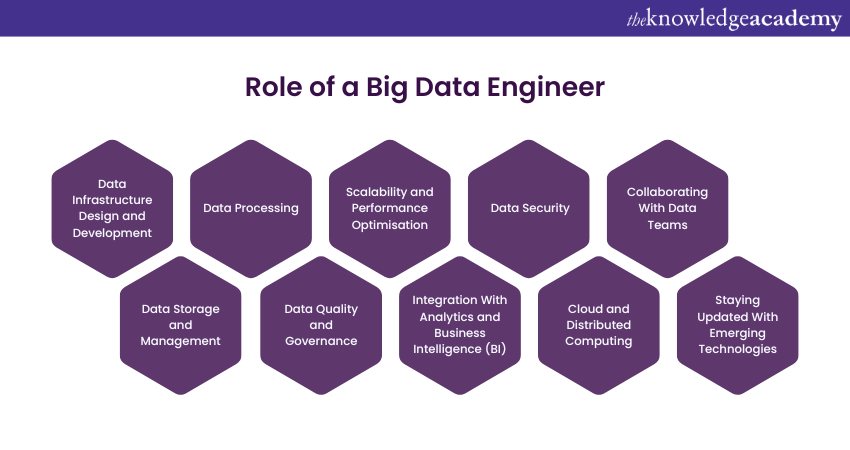
1) Data Infrastructure Design and Development: Big Data Engineers are responsible for designing and building robust data infrastructure. They create data pipelines that efficiently collect, store and process vast amounts of data from various sources.
2) Data Storage and Management: Big Data Engineers work with data storage technologies like Hadoop, Spark, and NoSQL databases to manage and organise massive datasets. They ensure data is stored securely and can be accessed quickly for analysis.
3) Data Processing: Processing large datasets in real time requires specialised skills. Big Data Engineers use frameworks like Apache Kafka and Apache Flink to handle high-velocity data streams.
4) Data Quality and Governance: Maintaining data integrity is crucial. Big Data Engineers implement data quality checks and governance measures to ensure accuracy, consistency, and compliance with data regulations.
5) Scalability and Performance Optimisation: As data volumes grow, scalability becomes critical. Big Data Engineers optimise data processing and storage systems to handle increasing workloads without sacrificing performance.
6) Integration With Analytics and Business Intelligence (BI): Big Data Engineers cooperate with Data Scientists and Analysts to integrate data into analytics platforms and business intelligence tools. This enables data-driven insights and reporting.
7) Data Security: Securing sensitive data is paramount. Big Data Engineers implement robust security measures to safeguard data against breaches and unauthorised access.
8) Cloud and Distributed Computing: Cloud technologies play a significant role in modern data engineering. Big Data Engineers work with cloud platforms like AWS, Azure, and Google Cloud to deploy and manage data infrastructure.
9) Collaborating With Data Teams: Big Data Engineers work closely with other data-related roles, such as Data Scientists, Data Analysts, and Database Administrators, to ensure smooth data operations and enable cross-functional collaboration.
10) Staying Updated with Emerging Technologies: The world of Big Data is ever-evolving. Big Data Engineers continuously explore and adopt new technologies and frameworks to stay at the forefront of data engineering.
Learn how to create Data models with our Big Data Architecture Training – join today!
Big Data Engineer Salary Based on Location
Below is a table showing the average salaries of Big Data Engineer in the specified countries:
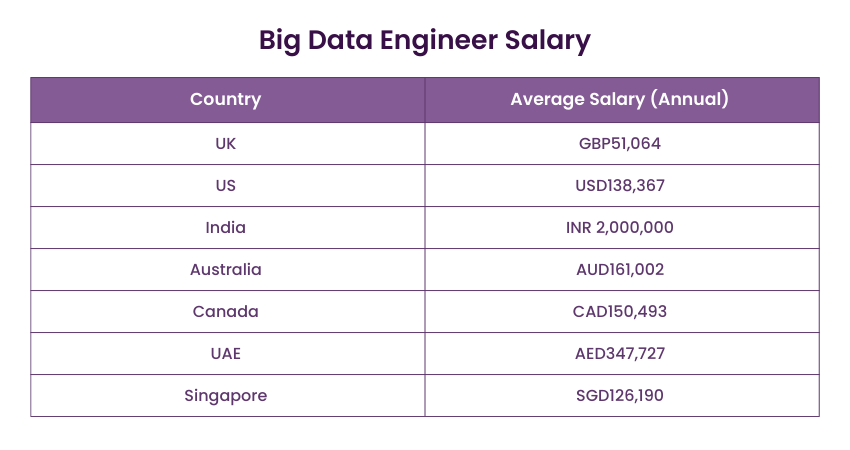
Source: Glassdoor
Note: Please remember that these figures depend on factors such as experience, location, and company size.
Big Data Engineer Salary Based on Experience
Here is a table showing the average salaries of Big Data Engineer in the UK. This data highlights the potential earnings for professionals in this field at different career stages.
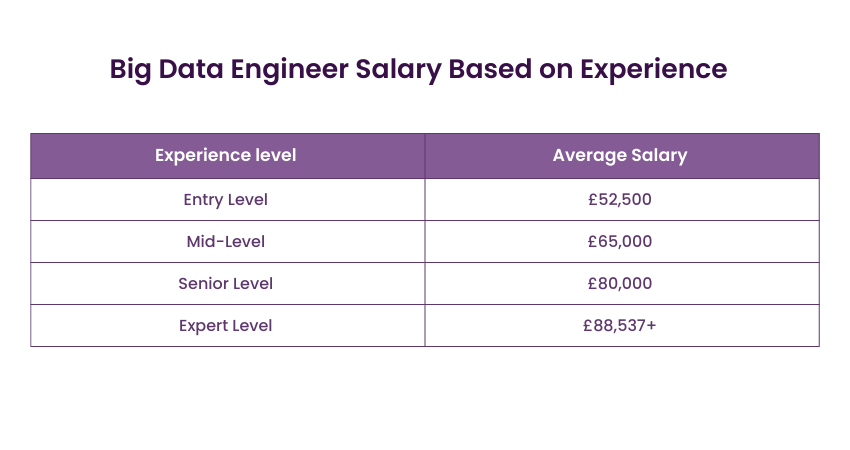
Source: Glassdoor
Big Data Engineer Salary Based on Job Roles
Big Data Engineer salaries are based on their specific job title. Here is an overview of different roles in the field and their salary ranges to help you understand what Big Data Engineers earn.
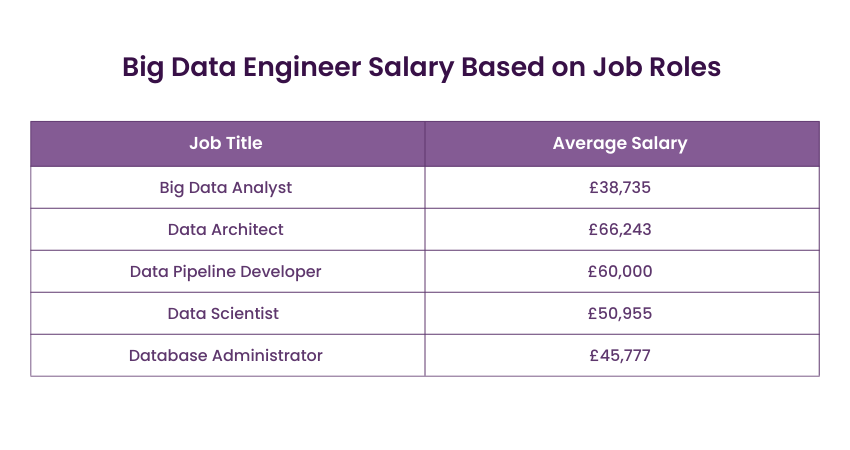
Source: Glassdoor
Factors Affecting Big Data Engineer Salaries
Big Data Engineer salaries can vary significantly based on several key factors. As organisations increasingly rely on data-driven insights, the demand for skilled data professionals, including Big Data Engineers, continues to grow. Here are the main factors that influence their salaries:
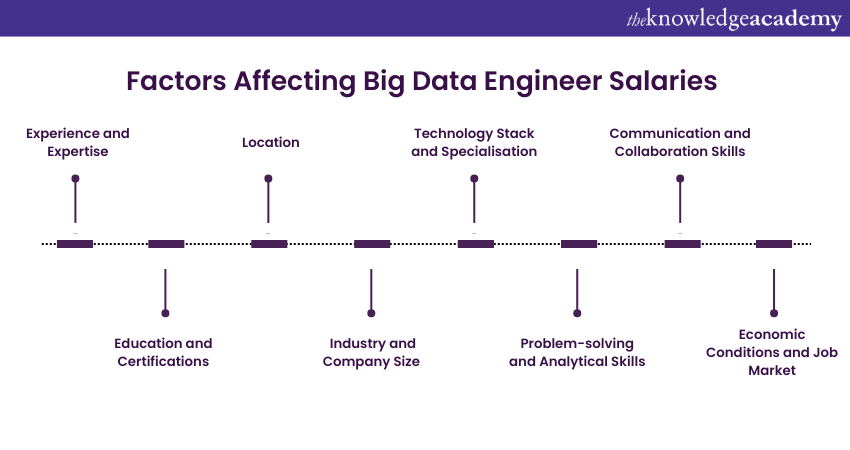
1) Experience and Expertise: Experience is a crucial factor in determining a Big Data Engineer's salary. Those with more years of relevant work experience typically command higher pay. As they gain expertise in handling complex data infrastructure and technologies, their value to employers increases.
2) Education and Certifications: Higher education and specialised certifications can positively impact a Big Data Engineer's salary. Advanced degrees in data science, computer science, or related fields, along with certifications in popular Big Data technologies like Hadoop, Spark, or Apache Kafka, can lead to higher pay rates.
3) Location: Geographical position plays a significant role in salary variations. Big Data Engineers working in cities or regions with a higher cost of living or where there is a strong demand for data expertise may receive higher salaries than those in less competitive markets.
4) Industry and Company Size: Certain industries, such as finance, healthcare, and technology, heavily rely on Big Data Analytics. Big Data Engineers working in these industries might receive greater salaries due to the demand for their specialised skills. Moreover, larger companies with extensive data infrastructure often have more resources to offer competitive compensation packages.
5) Technology Stack and Specialisation: The specific technologies and tools that a Big Data Engineer is proficient in can also impact their salary. Expertise in in-demand technologies like Apache Hadoop, Apache Spark, Python, SQL, and cloud platforms can lead to better-paying opportunities.
6) Problem-solving and Analytical Skills: Big Data Engineers who possess strong problem-solving and analytical abilities are highly valued. Their capacity to optimise data pipelines, identify efficiencies, and troubleshoot issues effectively can result in higher salaries.
7) Communication and Collaboration Skills: Effective communication and collaboration with cross-functional teams are essential in any data-related role. Big Data Engineers who can articulate technical concepts to non-technical stakeholders and work seamlessly with other departments tend to be more sought after and may receive better compensation.
8) Economic Conditions and Job Market: Overall economic conditions and the job market's demand and supply dynamics can influence salary trends. A booming economy with increased data-driven initiatives may lead to higher salaries for Big Data Engineers.
Conclusion
We hope you read and understand everything about Big Data Engineer Salary. The demand for Big Data Engineers is continuously increasing, and this trend is expected to drive their salaries higher. Factors like experience, education, training and technical expertise play an important role in determining their earning potential. Emphasising continuous learning is essential for success in this dynamic and ever-evolving field.
Understanding the fundamentals of Big Data with our Big Data and Analytics Course – join today!
Frequently Asked Questions

Yes, jobs in Big Data are generally well-paying because they require specialised skills in data analysis and management. Professionals in this field can earn competitive salaries due to the high demand for their expertise.

AI and Big Data complement each other rather than replace one another. AI uses Big Data to learn and make decisions, so both are important in their own right.

The Knowledge Academy takes global learning to new heights, offering over 30,000 online courses across 490+ locations in 220 countries. This expansive reach ensures accessibility and convenience for learners worldwide.
Alongside our diverse Online Course Catalogue, encompassing 17 major categories, we go the extra mile by providing a plethora of free educational Online Resources like News updates, Blogs, videos, webinars, and interview questions. Tailoring learning experiences further, professionals can maximise value with customisable Course Bundles of TKA.

The Knowledge Academy’s Knowledge Pass, a prepaid voucher, adds another layer of flexibility, allowing course bookings over a 12-month period. Join us on a journey where education knows no bounds.

The Knowledge Academy offers various Big Data and Analytics Training, including the Big Data Architecture Training, Big Data Analytics & Data Science Integration Course, and Big Data Analysis Course. These courses cater to different skill levels, providing comprehensive insights into Big Data Analyst Job Description.
Our Data, Analytics & AI Blogs cover a range of topics related to Big Data, offering valuable resources, best practices, and industry insights. Whether you are a beginner or looking to advance your Big Data Analysis skills, The Knowledge Academy's diverse courses and informative blogs have got you covered.
Upcoming Data, Analytics & AI Resources Batches & Dates
Date
 Python Data Science Course
Python Data Science Course
Mon 6th Jan 2025
Mon 24th Mar 2025
Mon 26th May 2025
Mon 28th Jul 2025
Mon 20th Oct 2025
Mon 1st Dec 2025







 Top Rated Course
Top Rated Course



 If you wish to make any changes to your course, please
If you wish to make any changes to your course, please


